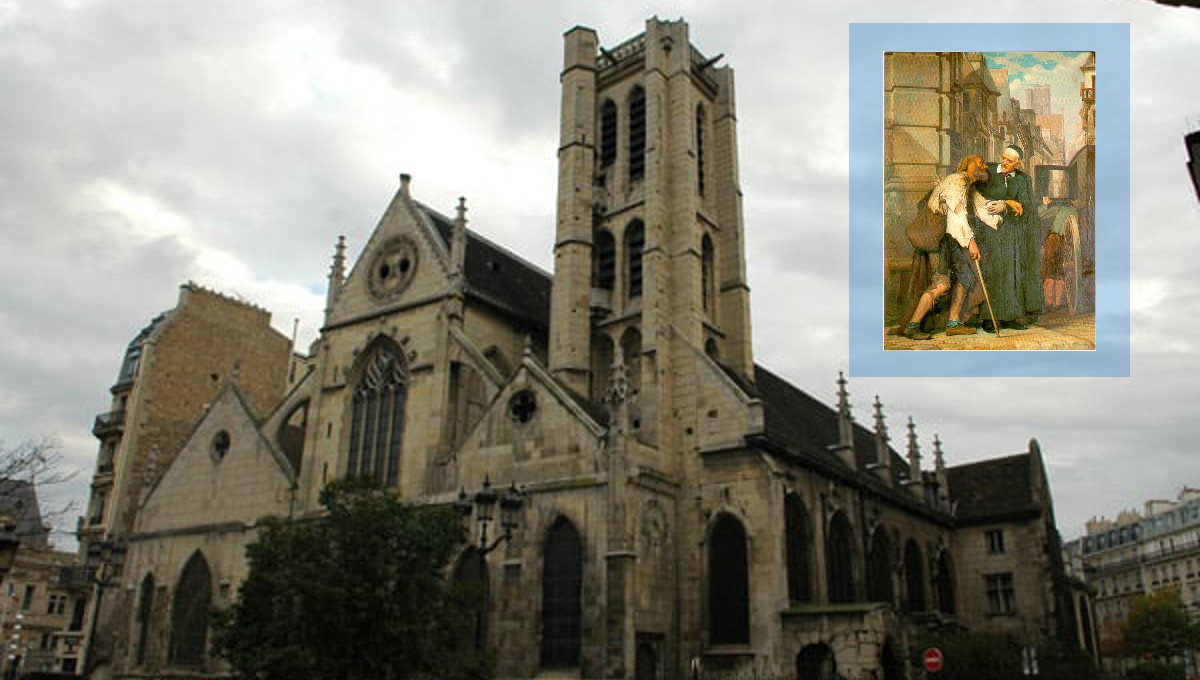The theme of the Jubilee Year of the Vincentian Charism accompanies us through this year. On this subject I am immediately confronted with this presentation of Saint Vincent, which is found in Paris in the church Saint-Nicolas-des-Champs.

Vincent receives and leads a poor, ragged man, leaning on a cane, across the street. The whole attitude of St. Vincent expresses invitation, openness, welcome and affection. His face is turned completely towards the poor man, who also looks into the eyes of Vincent; their eyes rest upon each other. The man seems exhausted and seems to be at the end of his powers. Whether the carriage in the background, where the door is open, is ready for this poor man is not clear; but the attitude of St. Vincent would be in the position to take him to his house in the carriage.
“Welcome the stranger” – here it is a stranger in several respects: an unknown, a down-and-outer, a poor, helpless one who comes from another “world.” Being alien can have many faces, even today!
Vincent does not have any previous contact. He does not stop at words, but lets his heart speak. Love becomes a deed in him, because he has taken seriously in the mystery that Christ meets us in every man, even when his countenance is disfigured to unrecognized. ” Vincent of Paul has lived what the Apostle John writes: “Dear children, let us not love with words or speech but with actions and in truth.” (John 3:18)
Pope Francis writes in his message on the first World Day of the Poor on 19 November 2017:
These words of the Apostle John voice an imperative that no Christian may disregard. The seriousness with which the “beloved disciple” hands down Jesus’ command to our own day is made even clearer by the contrast between the empty words so frequently on our lips and the concrete deeds against which we are called to measure ourselves. Love has no alibi. Whenever we set out to love as Jesus loved, we have to take the Lord as our example; especially when it comes to loving the poor. The Son of God’s way of loving is well-known, and John spells it out clearly. It stands on two pillars: God loved us first (cf. 1 Jn 4:10.19), and he loved us by giving completely of himself, even to laying down his life (cf. 1 Jn 3:16)
Such love cannot go unanswered. Even though offered unconditionally, asking nothing in return, it so sets hearts on fire that all who experience it are led to love back, despite their limitations and sins. Yet this can only happen if we welcome God’s grace, his merciful charity, as fully as possible into our hearts, so that our will and even our emotions are drawn to love both God and neighbor. In this way, the mercy that wells up – as it were – from the heart of the Trinity can shape our lives and bring forth compassion and works of mercy for the benefit of our brothers and sisters in need. [Message of His Holiness Pope Francis, First World Day of the Poor, no. 1].
“Welcome the stranger” – this invitation not only refers to those who are ‘strange’ to us, but it also allows us to look back at ourselves, so to speak. Are not we also sometimes strangers? Not only when we travel to another country, but also in our own country? Does our habit, our otherness as a woman of the Order, make us not often ‘alien’, even in a familiar environment? How do people who “have nothing to do with the church” see us? Do we feel welcome in such situations? Can we endure such situations? Perhaps such reflections help to put us in strange place within ourselves, to feel with them, and then to deal with them differently.
Another aspect of this topic, which I yet want to emphasize, is the following: am I not sometimes strange to myself? Are there not situations, experiences, events, in or after which I no longer know myself, I am alien to myself? How deeply it happens when someone accepts me in my being foreign (welcomes me) and helps me to accept myself; to be able to experience this own alienation as an opportunity and development. This experience can be helpful to perceive other people in their own alien existence and accompany them on their way to themselves, too. Being alien has many faces for me! It is not only the visibly poor who can be foreign to me, but also people who are alien to themselves, to whom the phrase “welcome the stranger” also applies. To meet all of them with an open heart is a constant challenge of our Christ.
In his letter to the World Day of the Poor, Pope Francis praises such a lived welcoming culture:
Blessed, therefore, are the open hands that embrace the poor and help them: they are hands that bring hope. Blessed are the hands that reach beyond every barrier of culture, religion and nationality, and pour the balm of consolation over the wounds of humanity. Blessed are the open hands that ask nothing in exchange, with no “ifs” or “buts” or “maybes”: they are hands that call down God’s blessing upon their brothers and sisters[no. 5].

Tableau de Pierre Brisset, Église de Saint-Nicolas-des-Champs, Paris
Source: Untermarchtal, 03.07.2017





0 Comments